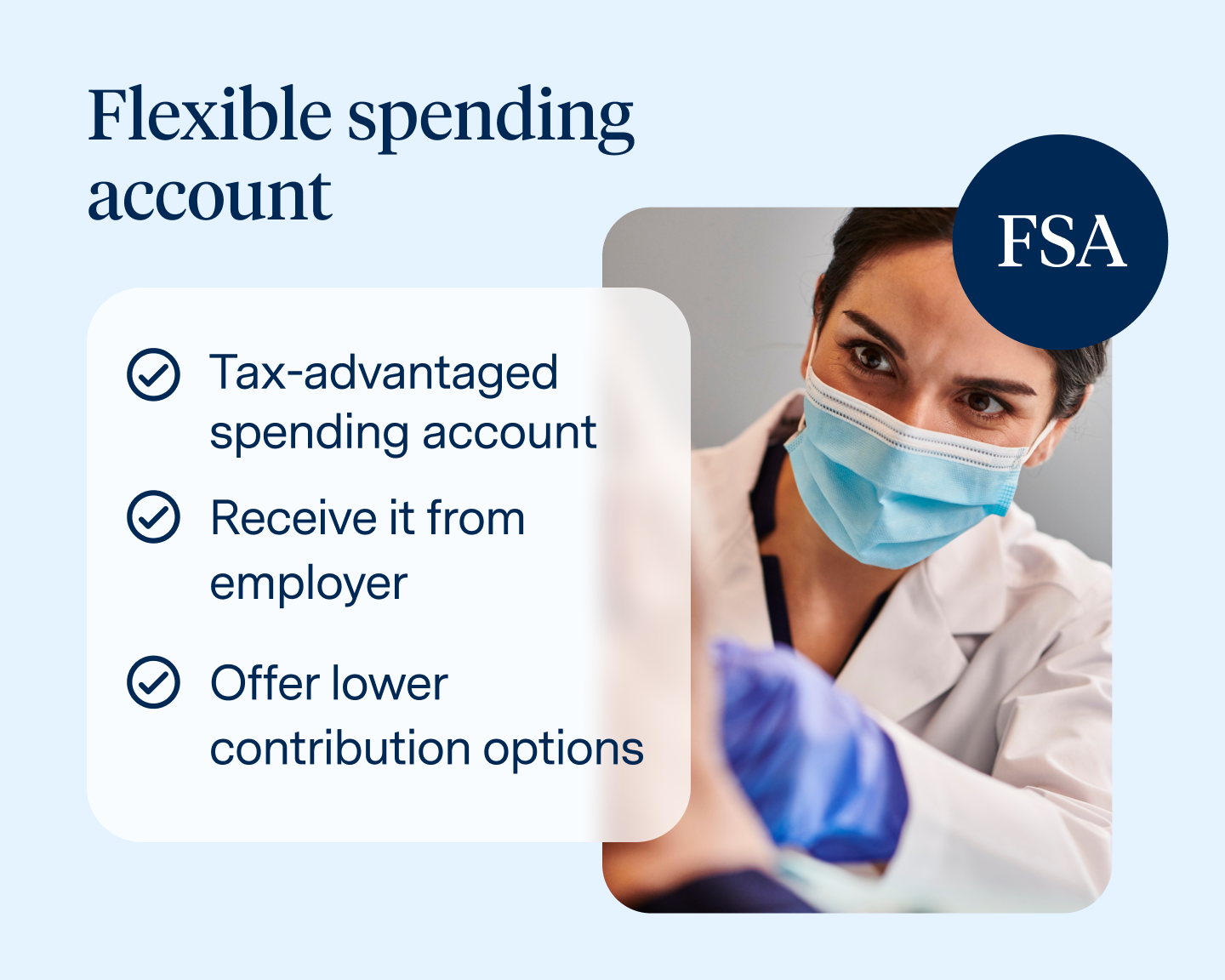
FSA vs. HSA
Discover the differences between an FSA vs. HSA. Depending on your financial goals and your healthcare needs, we’ll go over the main distinctions to help you maximize your tax-advantaged funds on exceptional dental care.
Understanding the difference: FSA vs. HSA
A Flexible Spending Account (FSA) and a Health Savings Account (HSA) are great ways to save money on your dental care services, while taking advantage of the tax benefits. With both types of accounts, you can set aside pre-tax dollars to pay for eligible dental expenses.
Although both accounts offer tax savings, it's also important to understand the differences and rules for each.

What is FSA?
A Flexible Spending Account (FSA) is an employee benefit program that allows you to set aside pre-tax funds for eligible medical expenses. This means that the money you contribute to your FSA is taken out of your paycheck before taxes, lowering your taxable income and potentially reducing the amount of taxes you owe.

What is HSA?
A Health Savings Account (HSA) is another tax-advantaged savings account that allows you to set aside pre-tax funds for eligible healthcare expenses. However, unlike an FSA your employer offers, you can open and contribute to an HSA on your own if you have a qualified high-deductible health plan.
FSA and HSA for dental care services
It’s commonly thought that FSA and HSA funds can only be used for medical expenses like doctor visits or prescription medications. However, it's important to understand that dental services also qualify.
FSA and HSA eligible dental expenses
Here are some examples of dental services that you can spend your FSA and HSA funds on:
Some over-the-counter dental products with a prescription
FSA and HSA benefits for dental care
There are several different benefits to using your funds on dental services, depending on whether you have an FSA vs. HSA. These benefits include:
Tax savings
By contributing to your FSA or HSA, it has the potential to lower your taxable income and reduce the amount of taxes you owe
Convenient payment option
By using your FSA or HSA funds for dental care, you can pay for services directly from your account rather than using after-tax dollars
Budget flexibility
Because you contribute to your FSA or HSA throughout the year, you can use these funds for dental care at any time without worrying about affording it all at once
Tips for maximizing your FSA and HSA funds
Understand your eligible expenses
It's important to understand which dental expenses are eligible for reimbursement through your FSA or HSA. This will build your confidence in using the account and will help you to maximize your plan’s benefits.
Plan ahead
Before the end of each year, we recommend reviewing your FSA or HSA balance and consider scheduling any necessary dental work before the funds expire.
Take advantage of preventive care
Routine cleanings and exams are typically covered 100% by most dental insurance plans, making it a great way to use your FSA or HSA funds without having to pay anything out-of-pocket.
Consider orthodontic treatment
If you or a family member needs orthodontic treatment, using your FSA or HSA funds can help alleviate the cost and make it more affordable.
Keep track of your spending
To get the most out of your FSA or HSA, it's important to keep track of your spending and submit reimbursement requests in a timely manner. This will ensure that you don't miss out on any eligible expenses.
Other ways to save on dental care services
Aside from using an FSA or HSA, here are a few other suggestions to save money on dental care:

Take advantage of discounts and savings plans
Many dental offices offer discounts and savings plans for uninsured patients at Aspen Dental. With our Aspen Dental Savings Plan¹, we offer up to 25% off services to help alleviate the cost of your receiving quality dental care.

Affordable dental services and financing options
It's important to shop around to find the best prices when it comes to your dental care. It’s our priority at Aspen Dental to provide you with affordable dental services with the best prices and offers, as well as great financing options.

Practice good oral hygiene
Preventive care is the key to saving money on dental care. By practicing good oral hygiene at home, like brushing and flossing regularly, you can protect the health of your smile.
FSA vs. HSA FAQs
How does an HSA work?
An HSA, or Health Savings Account, is a tax-advantaged savings account linked to a high-deductible health plan. It allows you to contribute pre-tax dollars for qualified medical or dental expenses, allowing for tax savings and a customized approach to healthcare financing. Contributions are tax-deductible, the funds grow tax-free, and withdrawals for eligible medical expenses remain tax-free. This makes it a great tool to help you manage healthcare costs while enjoying valuable tax benefits.
What is the difference between HSA and FSA?
The distinction between an HSA (Health Savings Account) and an FSA (Flexible Spending Account) is in their ownership and tax implications. Both types of accounts can be useful tools to help you manage your healthcare expenses, depending on your unique healthcare needs. HSAs are individual accounts linked to high-deductible health plans, offering triple tax benefits. FSAs are employer-sponsored accounts allowing pre-tax contributions for qualified medical expenses.
Can you use HSA for dental?
Yes, you can use your HSA (Health Savings Account) funds for dental expenses. This includes preventative care like exams and X-rays, as well as restorative care like dental fillings, tooth extractions and root canals. Some plans may also cover orthodontic treatment for both children and adults. It's also possible that your HSA can cover cosmetic procedures like teeth whitening and veneers. It's important to check with your specific HSA plan to see what services are covered.
How to use your FSA or HSA for dental care services?
Using your FSA or HSA for dental care services is a simple process. After you’ve enrolled in a plan, you will receive a debit card or reimbursement form to use for eligible expenses. Keep all of your receipts and documentation to submit for reimbursement. Some plans may also allow for automatic reimbursement if you use an in-network provider. It's best to check with your specific plan for details on how to use your FSA or HSA for dental care services.
Discover more for your smile
Savings to smile about
Maximize your FSA or HSA funds to keep your smile healthy and your wallet happy. Don’t wait to use your dental healthcare benefits, schedule an appointment with Aspen Dental today.
